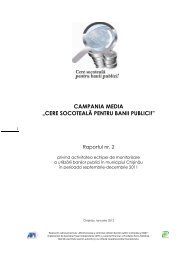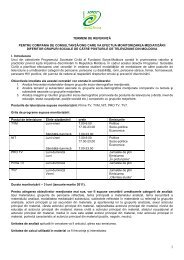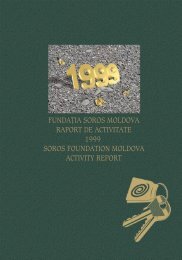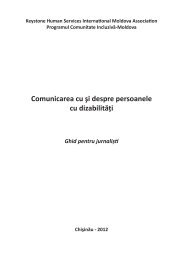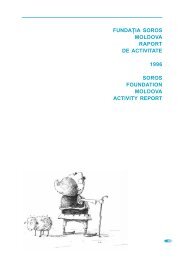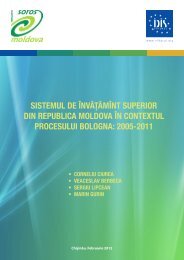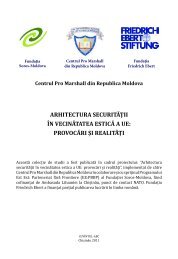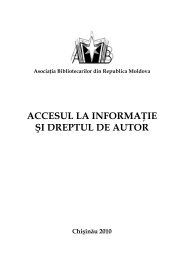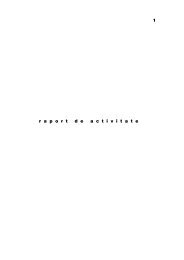Perceptions of the Population of the Republic of Moldova - Soros ...
Perceptions of the Population of the Republic of Moldova - Soros ...
Perceptions of the Population of the Republic of Moldova - Soros ...
- No tags were found...
Create successful ePaper yourself
Turn your PDF publications into a flip-book with our unique Google optimized e-Paper software.
<strong>Perceptions</strong> <strong>of</strong> <strong>the</strong> <strong>Population</strong> <strong>of</strong> <strong>the</strong> <strong>Republic</strong> <strong>of</strong> <strong>Moldova</strong> on Discrimination: Sociological Study 70Conclusions and recommendationsThe results <strong>of</strong> <strong>the</strong> research revealed <strong>the</strong> fact that <strong>the</strong> discrimination and <strong>the</strong> marginalization <strong>of</strong> certaingroups <strong>of</strong> people are real issues in <strong>the</strong> <strong>Republic</strong> <strong>of</strong> <strong>Moldova</strong>, which have increased over <strong>the</strong> last years. Thus,over 30% <strong>of</strong> respondents expressed <strong>the</strong> opinion that in <strong>the</strong> recent 5 years discrimination has increased.According to population and experts, <strong>the</strong> most discriminated social groups are <strong>the</strong> persons with mentaland physical disabilities, <strong>the</strong> poor, HIV-positive persons, representatives <strong>of</strong> gay and lesbian community,persons <strong>of</strong> Roma ethnicity and women.The social contexts <strong>of</strong> discrimination <strong>of</strong> <strong>the</strong>se groups vary, but most <strong>of</strong> <strong>the</strong>m face <strong>the</strong> discriminationproblem during employment, at <strong>the</strong>ir workplace, in education and medical institutions. While in case <strong>of</strong>employment and workplace <strong>the</strong> basic factors that start <strong>the</strong> discrimination are <strong>the</strong> health condition, sexualorientation, age or sex, in case <strong>of</strong> education and medical institutions <strong>the</strong> basic factor <strong>of</strong> discrimination formost social groups is <strong>the</strong> lack <strong>of</strong> financial resources.The analysis <strong>of</strong> social distance between <strong>the</strong> respondents and <strong>the</strong> disadvantaged groups <strong>of</strong> peoplehighlighted a low level <strong>of</strong> tolerance by <strong>the</strong> population in particular towards representatives <strong>of</strong> gay andlesbian community, HIV-positive persons, and individuals with mental disability. The reduced level <strong>of</strong>acceptance <strong>of</strong> <strong>the</strong> population in relation with <strong>the</strong>se persons is fed to a great extent by <strong>the</strong> existingprejudices in <strong>the</strong> society regarding marginalized groups. At <strong>the</strong> same time, <strong>the</strong> research confirms ourhypo<strong>the</strong>sis that <strong>the</strong> diversification <strong>of</strong> cultural and social relations <strong>of</strong> respondents with <strong>the</strong> representatives <strong>of</strong>marginalized groups increases <strong>the</strong> level <strong>of</strong> tolerance towards <strong>the</strong>m.In accordance with <strong>the</strong> research results, more than 1/3 <strong>of</strong> respondents have been victims <strong>of</strong>discrimination in <strong>the</strong> last three years or have witnessed discrimination <strong>of</strong> o<strong>the</strong>r persons. In both cases, <strong>the</strong>prevailing social contexts <strong>of</strong> discrimination were <strong>the</strong> workplace, <strong>the</strong> domain <strong>of</strong> healthcare and education.The individuals were discriminated in various ways, but most frequently <strong>the</strong>y have been verbally insulted,thrown out <strong>of</strong> <strong>the</strong> <strong>of</strong>fice, threatened, intimidated or even physically abused. As abusers, most frequentlywere indicated males that hold an <strong>of</strong>fice in public or private institutions. Even <strong>the</strong> majority <strong>of</strong> respondentsconsider that <strong>the</strong> abusers should be punished, over 2/3 <strong>of</strong> persons witness <strong>of</strong> a discrimination case took noaction against <strong>the</strong>, which shows <strong>the</strong> importance and need <strong>of</strong> educating <strong>the</strong> population in this regard inorder to change attitudes and behavior.The expert research highlighted also some practical recommendations directed to diminishing <strong>the</strong>discrimination phenomenon among disfavored groups. Thus, in <strong>the</strong> experts’ view, in order to enhance <strong>the</strong>level <strong>of</strong> equity <strong>of</strong> all groups <strong>of</strong> people exposed to discrimination, following actions are needed:• Harmonization <strong>of</strong> legislation <strong>of</strong> <strong>the</strong> <strong>Republic</strong> <strong>of</strong> <strong>Moldova</strong> with <strong>the</strong> European norms in <strong>the</strong> field <strong>of</strong>equal opportunities and combating <strong>of</strong> discrimination; adoption <strong>of</strong> <strong>the</strong> Law on Preventing andCombating Discrimination; adjusting <strong>the</strong> existent legal framework to <strong>the</strong> respective law anddevelopment <strong>of</strong> its implementation, monitoring and evaluation mechanism.• Active involvement <strong>of</strong> <strong>the</strong> community sector, in particular <strong>of</strong> active NGOs in <strong>the</strong> monitoring <strong>of</strong><strong>the</strong> implementation <strong>of</strong> <strong>the</strong> Law on Preventing and Combating Discrimination in view <strong>of</strong> making<strong>the</strong> central government and <strong>the</strong> local public administration accountable for <strong>the</strong> application <strong>of</strong><strong>the</strong> provisions <strong>of</strong> this law.• Establishment <strong>of</strong> an efficient, proportionate and deterrent sanction mechanism for acts <strong>of</strong>discrimination and its implementation by bringing charges in court to persons that discriminate,in particular in public institutions, and broad information <strong>of</strong> <strong>the</strong> society about <strong>the</strong>se cases and<strong>the</strong>ir negative effects.• Establishment <strong>of</strong> an independent institution on national level with comprehensive competencethat will have <strong>the</strong> objective to provide assistance to victims <strong>of</strong> discrimination in an independentmanner, so that <strong>the</strong> latter may exercise general petitions generated by acts <strong>of</strong> discrimination, andto conduct independent assessment studies about <strong>the</strong> discrimination phenomenon in <strong>the</strong>country.• Fostering <strong>of</strong> human rights as a value, on national and local level, in order to build a democraticmentality and to empower and build <strong>the</strong> capacities <strong>of</strong> <strong>the</strong> groups vulnerable to discrimination, inview <strong>of</strong> <strong>the</strong>ir more active involvement in <strong>the</strong> promotion and protection <strong>of</strong> <strong>the</strong>ir own rights.• Involvement <strong>of</strong> national and local mass media, in particular <strong>of</strong> TV channels, in <strong>the</strong> elimination <strong>of</strong>stereotypes and combating <strong>of</strong> discrimination by promoting a positive image <strong>of</strong> disadvantaged




